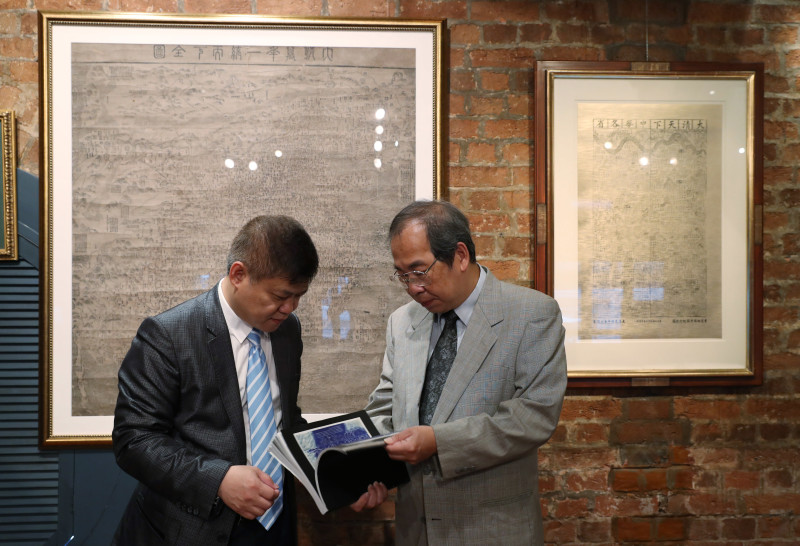Bargaining leverage

Sam Kwok, left, and Marcopolo Tam, members of a pro-China business group in Hong Kong, hold open a map in a book as they stand in front of two copies of larger maps dating from the Qing Dynasty purporting to back up China’s claims to vast parts of the South China Sea, in Hong Kong, Thursday, July. 14, 2016. An international tribunal ruled in favor of the Philippines this week saying that China had no basis for expanses claims in the sea. AP
The landmark ruling of the Permanent Court of Arbitration upholding the Philippines’ rights in its dispute with China in the South China Sea has generated varying degrees of alarm among political and security analysts. But the business community has been pragmatic. Being there on the ground dealing with their Chinese counterparts, local businessmen are less panicky in their views.
In fact, many business leaders are optimistic that economic relations between the Philippines and China will not be affected by the ruling of the arbitral court based in The Hague, although they admit taking a wait-and-see stance in the short term.
This positive outlook is partly due to the Duterte administration’s recent expressions of openness to bilateral talks with China over the dispute. In the past, some Chinese companies held back on investment plans in the Philippines following “strong” statements made by officials of the Aquino administration that piqued Chinese authorities.
This time is different. Donald Dee, president of the Employers Confederation of the Philippines, believes that the present administration is on the right track. His belief is based on President Duterte’s statements that the Philippines is not going to war, and that “we should look at how we could help each other economically”—a stance, he says, that also gives China a way forward without losing face. Dee predicts that China will increase its investments in the Philippines and that it will help the country “in more ways than one,” especially in infrastructure development.
The president of the influential Philippine Chamber of Commerce and Industry, George T. Barcelon, is also confident that the ruling that rejected China’s claim to almost the entire South China Sea will have no significant adverse impact on the trade and investment relationship of the two countries. He observes that even before the decision was handed down by the arbitral court, there had been initiatives to further improve bilateral trade and investment ties.
International credit watcher Moody’s Investors Service is likewise of the opinion that the ruling will not substantially affect either country’s economy, budget, or policy effectiveness. This expectation, it says, is underpinned by its baseline assumption that while there are actions or statements that may strain relations temporarily, these will not lead to a marked and protracted escalation of tensions.
According to latest data from the Philippine Statistics Authority, exports to China accounted for 9.8 percent of the total value of merchandise shipments sold to buyers abroad during the first five months. Imports from China, on the other hand, made up 17.7 percent of the total value of goods purchased by the Philippines between January and April—the biggest share among its trading partners. Meanwhile, Bangko Sentral ng Pilipinas data show that foreign direct investments from China amounted to $6 million in 2013 and climbed to $41.4 million in 2014 before it slid to a mere $0.57 million last year, owing to political posturing related to the maritime dispute.
Here’s another encouraging assessment from Perry Pe, president of the Management Association of the Philippines: “China, I believe, is smart enough to understand the worldwide implication of this decision. … China is a pragmatist. Thus, I don’t think the decision will affect our bilateral trade with China.” Sergio Ortiz-Luis Jr., president of the Philippine Exporters Confederation Inc., echoes Pe’s sentiment, hopeful that trade between the two countries will improve as they move toward negotiations for a peaceful resolution of the dispute.
From all indications, both countries are willing to sit down and negotiate. But China must now view the Philippines in a different light. With world opinion favoring the Philippines, the recent decision of the international arbitration court now gives the country a bargaining leverage when it officially decides to sit at the negotiating table with China to discuss what’s best to do moving forward.















